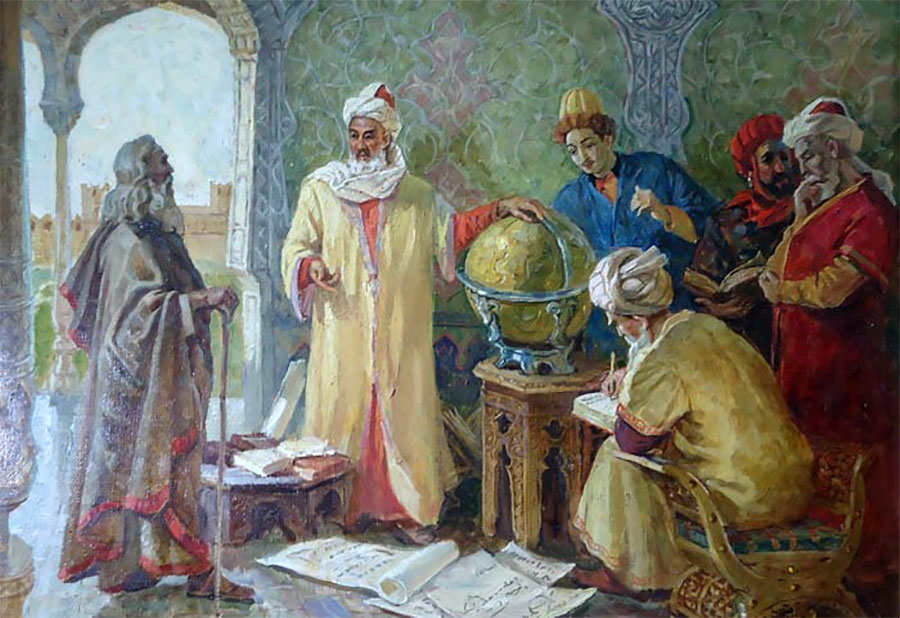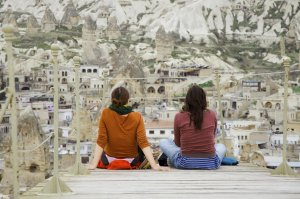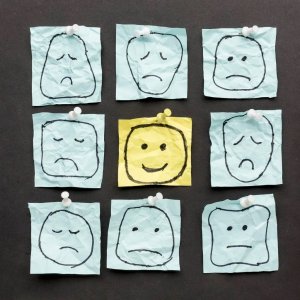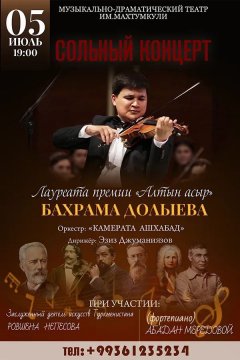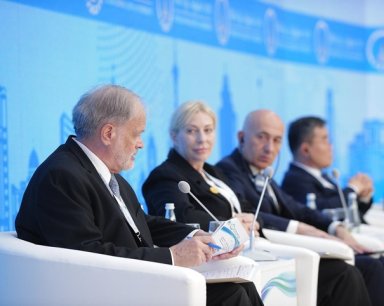To the fertile valleys and foothills of the East enroots ancient centers of world civilization of the Eats. Since ancient times, the East has lured well-known travelers, researchers, scientists, poets, musicians and adventurers with its mystery, specific charm and fascination.
Exotic Arab fairytales “One thousand and one nights” based on the symphonic suite “Sheherazada” by the composer N.Rimsky-Korsakov, the heartfelt poems of A.Pushkin “On the foothills of Georgia” in the refined music of S.Rachmaninov's romance; the sound of oriental instruments: zurnas, rebaba, oud, cymbals – immerse us in the atmosphere of the color of the original land, where amazing traditions exist, sweet dreams and passionate ardent feelings are born.
The East is the birthplace of great sages, philosophers and encyclopedic scientists, who have inscribed their bright page in the century-old unique history and culture. Among them are world well-known thinkers: Al-Khorezmi, Abu Reyhan Biruni, Al-Farabi, Ibn Sina, Mirzo Ulugbek, Zahiriddin Muhammad Babur and many others.
Abu Nasr Muhammad Al-Farabi (870-950) is an outstanding Turkic thinker, whose name is associated with an entire epoch in the formation of classic Muslim science, the greatest philosopher, logician, referred to in Arabic sources as “the second teacher” after Aristotle.
Photo: biographe.ru
Born in 870 in the town of Farab, he was educated in Baghdad. He studied a variety of sciences: logic, philosophy, mathematics, medicine, was fluent in several languages: Arabic, Turkish, Persian, Greek. Having lived in Baghdad for more than 20 years, he wrote most of his works there. Having gone to Haleb under the patronage of the Emir Sayf-al-Daul Bin Hamdan, he met famous sages of his time in his palace. But the secured life as a court dignitary did not satisfy the scientist, and Al-Farabi went on long journeys, leading a modest lifestyle. The solitude and constant work of the great philosopher, in which the main goal was the knowledge of truth and intellectual freedom, violated only classes with students.
The creative legacy of the brilliant scientists – encyclopedist is huge. His comments to the works of Aristotle “Metaphysics”, “Ethics”, “Rhetoric”, which contributed to the popularity of the works of Aristotle in Europe and in the East, treatises “The Pearl of Wisdom”, “Philosophical treatises”, “A treatise on the views of the inhabitants of a virtuous city”.
One of the most important social phenomena in the philosophical system of Al-Farabi is education and its main aim is to lead the human to perfection. In his main fundamental work, which brought him a world fame “Big book on music”, the scientist deeply researched the issues of musical science, elements of harmony, rhythm, composition techniques, Central Asian instruments that existed in the Arab caliphate.
Abu Ali Ibn Sina (Avicenna) – (980-1037) - medieval Persian scientist, philosopher, physician, poet, musician, representative of Eastern Aristotelianism. One of the influential scientist of the medieval Islamic world, who created more than 450 works in 29 fields of science. To the circle of mystic essays relates: “The Book of Birds”, “The Book of Predestination”. In the form of a literary poem with a quatrain, a “Treatise on love” is written, a story-allegory “Hai ibn Yakzan”, there are lyrical poetic rubai. These works significantly influenced the development of Iranian, Arabic and Turkic-language literature.
Photo: avicenna72.ru
From an early age, he showed exceptional abilities and by the age of 10 he knew the entire Quran by heart. At the age of 12, his knowledge and mind were amazing, adults start come to him to advise.
At the age of 16, Avicenna was invited to treat the most famous emir of Buhara himself. It was during this period that he become interested in studying medicine and new treatment methods.
In different periods of his life, he was a court physician of the Samanid emirs and the Dilemite sultans, as well as the vizier in Hamadan. Ibn Sina was distinguished by a phenomenal memory and sharpness of thought. The brightest greatest works: “The Book of Healing”, “The Canon of Medical Science”, “The Book of Salvation” have become popular scientific medical encyclopedias. They are devoted to logic, biology, psychology, music, astronomy. Description of diseases – diabetes, smallpox; functions of the brain as a center; medicines and methods of their manufacture and use; therapeutic use of honey, occupy the main place in the “Kanon”.
Photo: islamdag.ru
Avicenna’s words, spoken by him before his death, astonished others: “We die in full consciousness and take with us only one thing: consciousness that we have learned nothing” and this was said by a man who devoted all his energy, health, youth, life to the world cognition.
In the X century, several major scientific – research centers functioned in the east: the Cairo Observatory in Egypt, Rei in Iran and the Academy of Central Asia of Khalif Mamun.
One of the outstanding teachers at the Academy of Mamun was the famous philosopher and scientists Abu Reyhan Biruni (973-1048). In his youth, Al-Biruni become a prominent person among astronomers, mathematicians, doctors, designed an astrolabe for observing solar eclipses and was the first to produce a globe. Having visited many cities and countries (Kyat, Kurgan, India), Biruni studied the history and culture of the peoples who inhabited them, and the chronology systems.
Photo: biographe.ru
Priceless scientifiс heritage of Biruni includes works: “Chronology of past generations”, “Hindustan”, “Book of Laws”, “Arabic theory of the movement of the earth”. The main scientific merit of the scientist is the invention of a new method of measuring the Earth using a 7.5-meter-diameter wall square constructed by him in 995, and the theory of the Earth's rotation around the Sun, put forward even before the Polish scientist N. Copernicus (1473-1543).
Proficient in Sanskrit, Persian, Sogdian, Syriac, and Hebrew, he contributed to the development of principles for translating natural science terminology from one language to another.
The great scientists of ancient times played a significant role in the formation of sciences in different countries of the East, the expansion of interchange between regions and continents, and the development of world civilization as a whole. Their unique creations have an unending value and acuteness for the current epoch.
The proposals of the scientists-teachers of the east Al-Farabi, Al Reyhan Biruni and Ibn Sin to introduce into the educational system the disciplines: literature, mother tongue, mathematics, geography, history, physical education – is successfully used in the modern educational curriculum and contributes to the formation of a spiritual outlook and the development of physical qualities of young people.
Source: islam.az; hozir.org/velikie-uche; uchportal.ru; ru.m.wikipedia.org; ruh.kz
Also read:

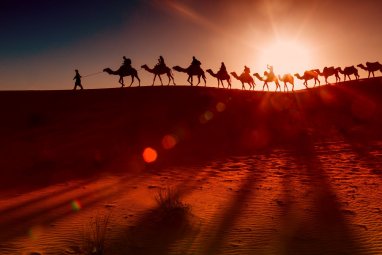
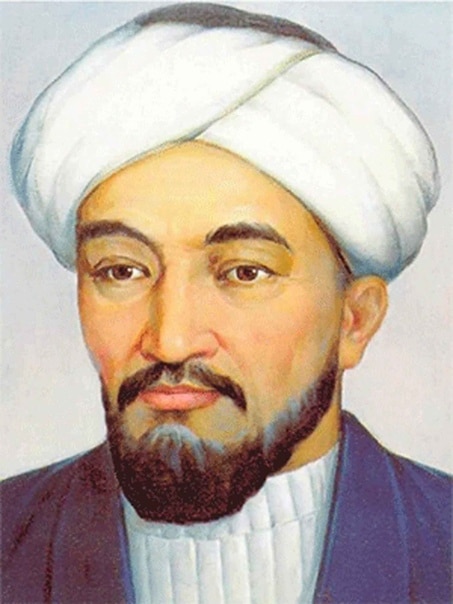
.jpg)
